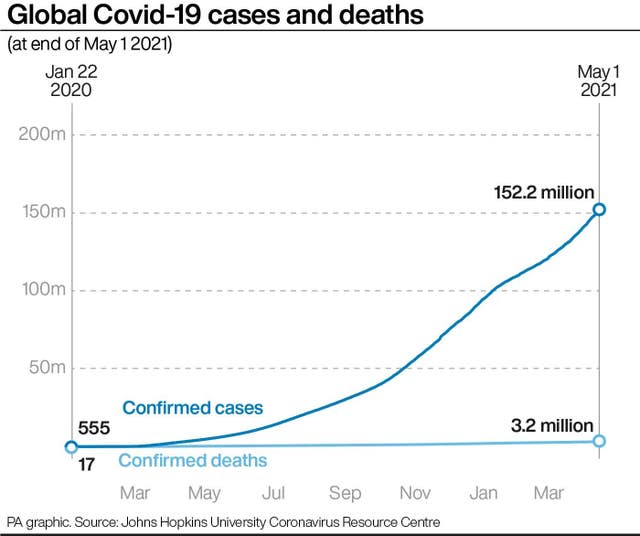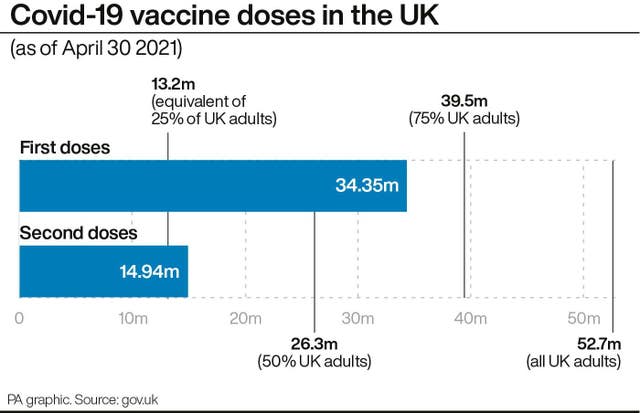Secondary school pupils will reportedly be offered Covid-19 vaccinations from September under plans being developed by the NHS.
Health service officials are compiling planning documents which include a measure to offer a single dose of the Pfizer jab to children aged 12 and older when the new school year starts, according to The Sunday Times.
Pfizer has said trials of its vaccine in children aged 12 to 15 showed 100% efficacy and a strong immune response.
The plans, which the Times said it had confirmed with Government and NHS sources, are contingent on advice from the Joint Committee on Vaccination and Immunisation (JCVI) due this summer.
Committee member Professor Adam Finn, from the University of Bristol, told the Times: “We need to be in a position to immunise children, particularly teenagers, promptly and efficiently if we need to.
“It is extremely important that education in the next academic year is not disrupted in any way,” the paediatrician said.
But he added: “We should only be doing vaccine programmes when we need to do them.”
Prof Finn told Times Radio on Sunday it was “very much an open question” whether secondary school pupils will need to be vaccinated from September.
While children are unlikely to fall ill with Covid-19, they do play a role in transmitting the virus.
Prof Finn said on April 24 that children had been frustratingly “left behind” in the Covid-19 vaccine programme, adding he wanted to “get on” and conduct the necessary trials in children.
Linda Bauld, professor of public health at the University of Edinburgh, backed the plan to vaccinate pupils from the start of the new school year.

She told Times Radio on Sunday: “I think we are moving in that direction.
“I think the reason to vaccinate children… is really to add to herd immunity.”
She added: “If the current trials are promising then I do think (vaccinating children from September) will happen.”
A spokeswoman for the Department of Health and Social Care (DHSC) said: “No decisions have been made on whether children should be offered vaccinations and we will be guided by the experts once clinical trials have concluded.
“As we’ve already said, we are preparing for a booster programme to take place from the autumn and we continue to plan for all scenarios.
“We have hit our target of offering vaccines to everyone in phase one of the programme and we are on track to offer a jab to all adults by the end of July.”
Meanwhile, Culture Secretary Oliver Dowden hailed a club night pilot event in Liverpool as a “huge moment” in the UK’s return to normality. Some 3,000 clubbers returned to the dancefloor at The First Dance, hosted by club night Circus, without social distancing or face coverings on Friday.
A former chief scientific adviser to the Government warned, however, the potential for coronavirus cases to “reignite” remained as many adults were still unvaccinated.
Professor Sir Mark Walport, a member of the Scientific Advisory Group for Emergencies (Sage), told BBC Radio 4’s Today programme on Saturday the country was on cusp of being able to loosen more restrictions.
But he warned that, with around 35% of adults not yet vaccinated, there was the potential for the “spark to reignite” and cases to rise again.
New data revealed that up to April 30, nearly 15 million people in the UK had received a second dose of coronavirus vaccine.
The Government figures showed that that of the 49,287,257 jabs given in the UK so far, 34,346,273 were first doses and 14,940,984 were second doses.

Elsewhere, the DHSC has announced surge testing would be deployed across parts of east London after several cases of the South African and Brazilian variants were detected.
It said NHS test and Trace was working with Tower Hamlets Council to provide additional testing and genomic sequencing in targeted areas within the E1 postcode from Sunday.
The department said all confirmed cases were self-isolating and there were no links between the new cases and the cluster of cases recently identified in the south London area.
The announcement comes as the Government said a further seven people had died within 28 days of testing positive for Covid-19 as of Saturday, bringing the UK total to 127,524.




Comments: Our rules
We want our comments to be a lively and valuable part of our community - a place where readers can debate and engage with the most important local issues. The ability to comment on our stories is a privilege, not a right, however, and that privilege may be withdrawn if it is abused or misused.
Please report any comments that break our rules.
Read the rules hereLast Updated:
Report this comment Cancel